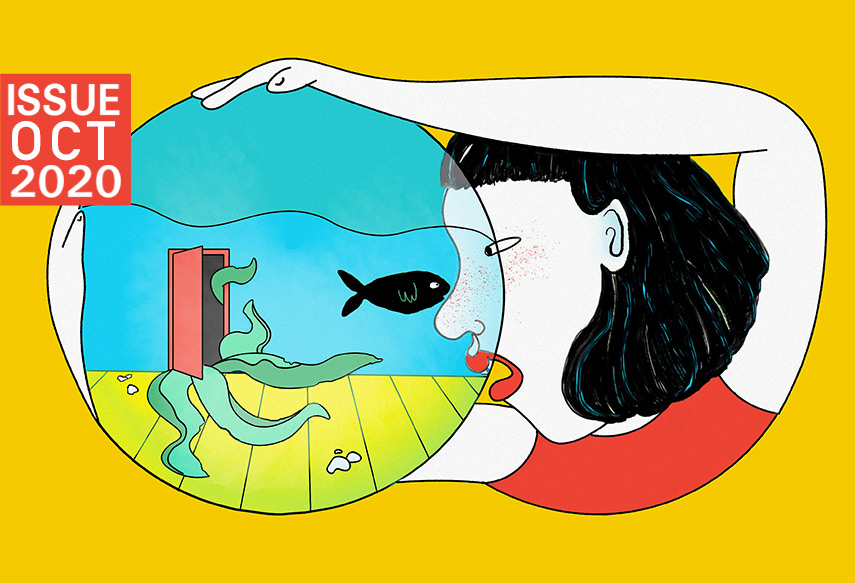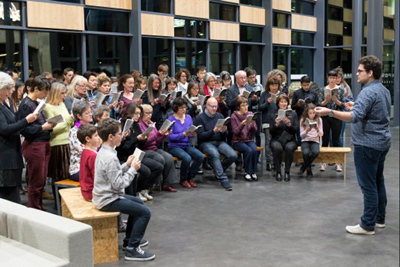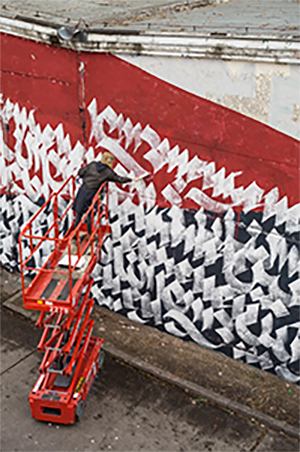- Featuring
- Itō Hiromi
- Andrés Neuman
- Gunnar Wærness
- Elisabeth S. Clark
- Rabindranath Tagore
- Sinan Çankaya and Radna Fabias
Approaching the event horizon of a tumultuous year, we’re proud to bring you Vanishing Point, our Fall 2020 edition, featuring new writing from 32 countries and a Dutch Special Feature made possible by the Dutch Foundation for Literature and curated by guest editor Michele Hutchison, recently announced co-winner of the International Booker Prize. Just as a vanishing point is the nexus upon which receding parallels converge, so too is literature the portal through which discrete reading selves dissolve into a pure experience of “the other,” as Andrés Neuman reminds us in an exclusive interview. Within these pages, alterity manifests in dizzyingly myriad forms, from Chechen-Russian documentarian Polina Zherebtsova to exiled Uyghur poet Tahir Hamut. Also speaking from displacement are heavyweights like Ariana Harwicz responding to the pandemic with an apocalyptic aria, and Nobel laureate Rabindranath Tagore pricking the emptiness of abandonment, “Who belonged to whom in this world?” This question finds an enjoinder in Itō Hiromi’s essay Living Trees and Dying Trees, where the distinction between wrinkled bark and wrinkled skin breaks down in a meditation on life through the prism of change.
Such impossibility of fixity is a central theme running through our spotlight on contemporary Dutch literature illustrated by guest artist Eliza Savage. Here for the first time in English readers may encounter the stunt doubles, fraudsters, and sham clergy of literary phenom Radna Fabias, whose debut poetry collection Habitus picked up almost every major literary award in the Netherlands and in Belgium. The shutter of her poems churns out new frames rapidly, each starring another potential identity—“only the final frame is black.” An unstable, vanishing self is also the crux in both Sinan Çankaya’s bestselling memoir of being othered while trying to combat racism from inside the Dutch police force, and in Wytske Versteeg’s account of her struggle with the trauma of sexual abuse in the aptly titled “Vanishing Point.”
In a sense all writing produces some kind of vanishing point. As Eleanor Updegraff suggests in her review of Paula by Sandra Hoffmann, fiction is a balancing act between forces that rip the self apart and those that hold it together. The result need not always be a “language of nothingness” as the one Updegraff claims Hoffmann and her translator have given us, but perhaps a kind of polyphony best exemplified in the work of the great Portuguese author Fernando Pessoa, who features in this issue as a multitude of characters in an extract from Armando Nascimento Rosa’s play Fernando and his Grandmother. While interrupting voices and registers cascade through Gunnar Wærness’s poetry, visual artist Elisabeth S. Clark has enlisted more than one hundred performers to take part in her similarly polyvocal book concertos. And just as Clark’s foray into “bookness” has led her into the “driest of deserts,” so Mexican author Josefina Vicens sets her focal points on the blank page—in fact, these “empty texts” caused Octavio Paz to remark, “nothing—which is found in all of us—by the mere act of accepting it, becomes everything: an affirmation of the solidarity and the brotherhood of man.”
Affirmation of solidarity has been the basis of every one of our issues, newsletters, educational guides, posts on Facebook and Twitter since 2011. As we close the chapter on one full decade and look forward to another, all readers are invited to take this ten-minute annual reader survey to shape the future of Asymptote—do so by November 22, and you might be one of three to walk away with an Asymptote Book Club subscription! At the moment, without any ongoing institutional support, exactly 60 sustaining members and two masthead members are providing USD692 a month to keep the whole project afloat—which is not quite enough, alas. If you have benefitted in any way from our advocacy these past ten years, and would like to see us continue instead of vanish, please take a moment to show your support: Become a sustaining or masthead member today.
—Lee Yew Leong, Editor-in-Chief
Editorial Team for Issue October 2020
Editor-in-Chief: Lee Yew Leong (Taiwan/Singapore)
Assistant Managing Editors: Daljinder Johal (UK/India), Malak Khalil (UK) and Lindsay Semel (US/Portugal)
Section Editors:
Lee Yew Leong (Taiwan/Singapore)
Garrett Phelps (USA)
Caridad Svich (USA/UK)
Ah-reum Han (USA/South Korea)
Sam Carter (USA)
Eva Heisler (USA)
Henry Ace Knight (USA)
Editor of Special Feature on Dutch Literature: Michele Hutchison (UK/Netherlands)
Assistant Editors: Edwin Alanís-García (USA), Alyea Canada (USA), (Canada), Whitney DeVos (Mexico/USA), Helena Fornells (UK), Barbara Halla (France), Marina Martino (UK), Maya Nguen (USA), Erik Noonan (USA), Andreea Scridon (UK/Romania), Lindsay Semel (Portugal/USA), P. T. Smith (USA), Jay G. Ying (UK), and Lin Chia-wei (Taiwan)
Contributing Editors: Ellen Elias-Bursac (USA), Aamer Hussein (UK), Sim Yee Chiang (Singapore), Dylan Suher (USA), and Adrian West (USA)
Translation Tuesdays Editor: Edwin Alanís-García (USA)
Art Director: Lee Yew Leong (Taiwan/Singapore)
Assistant Director, Educational Arm: Kent Kosack (USA)
Editors-at-large, Argentina: Allison Braden and Sarah Moses
Editor-at-large, Brazil: Daniel Persia
Editor-at-large, El Salvador: Nestor Gomez
Editor-at-large, Guatemala: José García
Editors-at-large, Hong Kong: Jacqueline Leung and Charlie Ng Chak-Kwan
Editor-at-large, Japan: David Boyd
Editor-at-large, Lebanon: MK Harb
Editor-at-large, Mexico: Andrew Adair
Editor-at-large, Malaysia: Tan Kwan Ann
Editor-at-large, Morocco: Hodna Nuernberg
Editor-at-large, Palestine: Carol Khoury
Editor-at-large, Peru: Paloma Reaño
Editor-at-large, Romania and Moldova: MARGENTO
Editor-at-large, Serbia: Jovanka Kalaba
Editor-at-large, Singapore: Shawn Hoo
Editor-at-large, Sri Lanka: Chamini Kulathunga
Editor-at-large, Slovakia: Julia Sherwood
Editors-at-large, Taiwan: Vivian Chih and Darren Huang
Editor-at-large, Uzbekistan: Filip Noubel
Editors-at-large, Vietnam: Thuy Dinh and Quyen Nguyen
Masthead for Issue October 2020
Fiction and Nonfiction: Lee Yew Leong
Poetry: Garrett Phelps
Drama: Caridad Svich
Criticism: Sam Carter
WoW: Ah-reum Han
Special Feature on Dutch Literature: Michele Hutchison
Visual: Eva Heisler
Interviews: Henry Ace Knight
Illustrations and Cover: Eliza Savage
Incoming Nonfiction Editor: Bassam Sidiki
Asst. Interview Editor: Sophia Stewart
Assistant Managing Editor (supervising Assistant Editors): Lindsay Semel
Assistant Managing Editors (supervising Editors-at-Large): Daljinder Johal and Malak Khalil
Assistant Managing Editor (supervising issue production): Anita Christensen
Communications Director: Samuel Kahler
Communications Manager: Stefan Kalpachev
Director of Outreach: Alessandro Mondelli
Chief Executive Assistant: Samuel Miller
Senior Executive Assistant: Bernice Seow
Executive Assistants: Rachel Farmer and Julie Shi
Blog Editors: Josefina Massot, Sarah Moore, and Xiao Yue Shan
Newsletter Editor: Rita Horanyi
Guest Artist Liaison: Berny Tan
Senior Copy Editors: Devarati Chakrabarti, Rose Green, and George Macbeth
Copy Editors: Alice Banks, Andrea Blatz, Bella Bosworth, Sophie Hoffman, Samantha Kirby, Rachel Rosenberg, Monica Sestito, and Rachel Stanyon
Technical Manager: József Szabó
English Social Media: Hyunjin Cho, Felipe Fernandez, Charlotte Jackson, Scarlett Castillo, Georgina Fooks, Isabelle Rew, and Ruwa Alhayek (incoming)
Spanish Social Media: Sergio Serrano, Sofia Monzó, Madeline Robinson
French Social Media: Filip Noubel
Chinese Social Media: Jiaoyang Li and Jessica Wang
Graphic Designer: Renée Elizabeth Clark and T. De Los Reyes
Video Producer: Xiaolu Wang
Merchandise Designer: Michael Laungjessadakun
Marketing Manager: Ivana Galapcheva
Assistant Director, Educational Arm: Kent Kosack
Educational Arm Assistants: Lucchini Clémence, Mary Hillis, and Clare Spaulding
Director of Sustainability and Business Development:
Business Developer: Katherine Kamel
Interns: Anita Christensen, Jennifer Hon Khalaf, and Raminta Uselytė
Asymptote would like to acknowledge the support especially of:
as well as Lucette Chatelain and Barbara den Ouden, without whom the Dutch Literature Feature could not have happened; Sooyun Yum of LTI Korea, and Janet Steel of the Commonwealth Foundation.
For their generous donations, our heartfelt thanks go too to Anna Aresi, Anne Berk, Daniel Hahn, Geoffrey Howes, Harry Leeds, Il Park, Jeffrey Boyle, Joachim Redner, Joy Szeredi, Katarzyna Bartoszynska, Mallory Truckenmiller, Marjolijn de Jager, Mark Cohen, Martin Ingebrigtsen, Matthew Mazowita, Meng Xiangxiu, Monty Reid, Nancy Relaford, Nhi Ta Huong, Pavlos Stavropoulos, Ruth Diver, Sarah Glenski, Theresa Henderson, Velina Manolova
We welcome new members of the Asymptote family Donald Conover, Ferran Pericas Cladera, Jenna Colozza, Jane Kirby, and Anne-Lise Remacle.



